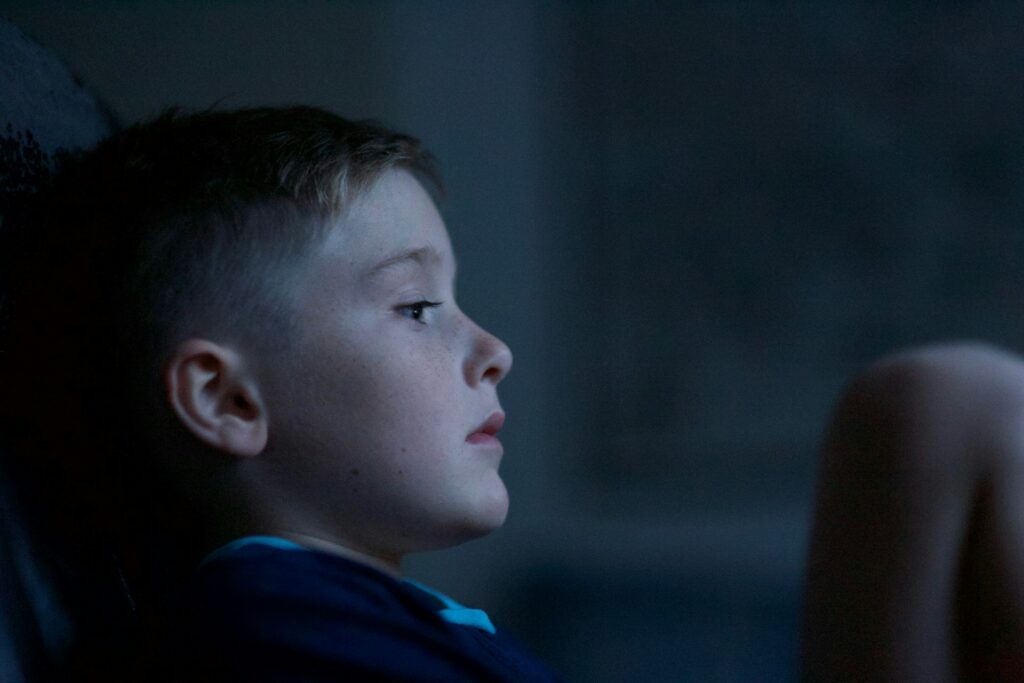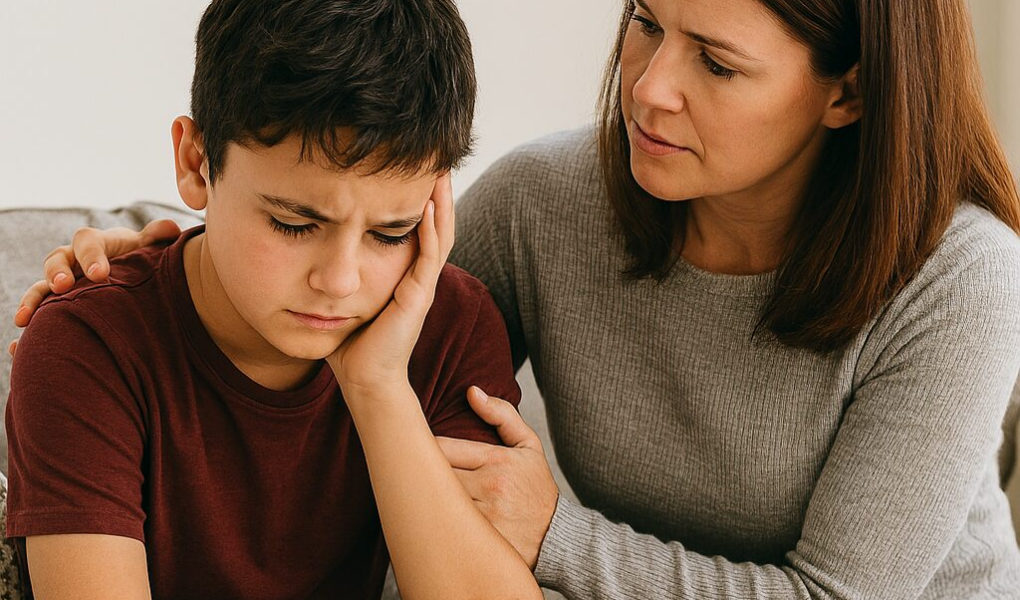It can be difficult to learn that your child is struggling with depression. Many parents feel confused, scared, worried, and/or they might deny that this could be happening to their child. It is not abnormal to attempt a bargain and say that perhaps they are just sad or going through a tough time. Oftentimes, this is a reaction born out of fear or a lack of understanding of what depression is.
Whether your child is struggling with depression or not, parents should procure to be well-informed on the matter. This will allow you to be prepared and ready to help with the appropriate tools that can support your child if they ever need your assistance.
Disclaimer: The information provided in this post is for general information and educational purposes only. It is not a substitute for professional advice.
What is depression?
Contrary to popular belief, depression is not simply feeling sad or down due to life’s problems. It’s not something you can shut down and feel better by doing something to distract your mind.
The World Health Organization says that “Depressive disorder (also known as depression) is a common mental disorder. It involves a depressed mood or loss of pleasure or interest in activities for long periods of time. Depression is different from regular mood changes and feelings about everyday life. It can affect all aspects of life, including relationships with family, friends and community. It can result from or lead to problems at school and at work.” Depressive disorder (depression). https://www.who.int/news-room/fact-sheets/detail/depression: World Health Organization; 2025. Licence: CC BY-NC-SA 3.0 IGO.
Depression is a mental disorder. It is characterized by experiencing feelings of hopelessness, lack of interest in things they once used to enjoy, feelings of worthlessness, isolating themselves, changes in mood, changes in appetite, and thoughts of suicide and/or self-harm.
If you notice any of these symptoms in your child, it is essential to provide the support they need and take the necessary steps to help them feel better.
3 things you can do to help your child through depression

1. Support them
At first, you may not know where to start, and it can be a stressful and confusing time for both you and your child.
Start by telling them that you love them and will be there for them every step of the way.
Your child may not be able to see the light at the end of the tunnel; therefore, you need to be that light they can immediately depend on for safety. Knowing that you are right by their side will help them feel less alone during this dark moment in their life.
Then you can do the following:
- Reach out to a healthcare provider. This could be their primary doctor and/or a therapist. They can determine the best course of treatment for your child and give you important information on how to handle your child’s condition.
- Ask your child directly what you can do to help them. They may not always be forthcoming with their feelings and thoughts. Sometimes, they may not even know why they are feeling this way or be able to provide you with any information as to how you can support them. Or they might surprise you and tell you exactly what they need from you. Either way, by asking them directly, you’ll receive important information as to how they are feeling and where their mental state is at the moment. This will allow you to have a better grasp of what’s going on with them.
- Ask your child what makes them feel worse. Knowing what their triggers are will allow you to avoid them, thereby not worsening their condition.
2. Find out the root of the problem
It is crucial to figure out what has been affecting your child and causing them to be depressed. Sometimes the cause may be prolonged bullying, lack of sleep, family stressors, loss of a loved one, peer pressure, academic stress, brain chemical imbalance, hormonal imbalance, or other factors.
Discovering the root of the problem will allow you to address it and make any necessary changes to help them get better. In cases where the issue stems from a chemical or hormonal imbalance, medication may be needed.
3. What NOT to do
Part of helping your child through depression can be as simple as avoiding doing or saying things that could worsen their condition.
Here are some things you should avoid:
- Invalidate their feelings. Don’t say that they are being dramatic and that it is not a big deal.
- Telling them to snap out of it. Saying this causes the complete opposite effect. It makes it worse. It implies that they have control over their depression and puts all of the blame on them.
- Making it about yourself. Going on about how you had it so much worse than they do, and you never were depressed. Or, on the other hand, telling them that you were depressed but pushed through it, as if they should just follow your footsteps.
- Telling them that they are ruining the family dynamic. It is unfair to make your child feel as if they are ruining the family because they are unwell. It is cruel, as this inadvertently places all the blame on them.
- Ignore it. Don’t act as if nothing is happening and like you are completely unaware of their struggles. You are essentially letting them know that they are all alone and you do not care about what they are going through. This can cause them to isolate themselves and fall deeper into depression.
What if they are having thoughts of self-harm and/or suicide?

Nothing will send chills down your spine like learning that your child has been thinking of hurting themselves. It is something no parent wants to hear. However, it is imperative to handle it correctly and to take the appropriate actions, since at that moment your child is in a very delicate state.
You need to stay calm and level-headed. Do not panic or start shouting at your child. Instead, talk to them. Ask them about what is going on and why they are feeling this way. Do not be afraid to talk about their feelings of self-harm or thoughts of suicide. This is not going to encourage them to follow through.
Shodair Children’s Hospital says, “It is a common misconception that talking or bringing up suicide will make it more likely to occur, but that’s simply not the case. In fact, research has shown otherwise – asking a child directly about whether they are experiencing suicidal thoughts can make a child feel both seen and cared for during a time where they may be feeling the exact opposite.” Suicide in Children: A Guide for Parents. https://shodair.org/suicide-in-children-a-guide-for-parents/. Shodair Children’s Hospital. 2025.
What you should do next:
- Depending on the severity of their symptoms, consider blocking access to any weapons in the house
- Establish a routine check-in with your child
- A “no closed-door” policy for the time being
- Maintain open communication with your child. Let them know they can come to you anytime, anywhere
- Reach out to their primary care doctor and/or therapist
Just because your child is currently having these thoughts doesn’t mean they will follow through with them. With the right support and help, they can get better. So don’t lose heart, your baby can get better.
In conclusion
No parent wishes for their child to ever have to suffer from depression. However, it is important to be prepared and understand what it is and how we can help our children through it. It is scary, and it can leave you lying awake many nights with worry. But know that this is not final, your child can get better. As long as they have your love and support, it is possible to face depression and come out triumphant on the other side. It might take some time and rough patches, but you will get there.
Resources
- National Suicide Prevention Lifeline 24/7: Call or text 988 (Languages: English and Spanish/Español)
- National Suicide Prevention Lifeline website: https://988lifeline.org/ (Access for Deaf/HoH as well)
- 24-hour crisis support: Text HOME to 741741
- In case of suicide attempt or imminent danger: Call 911




